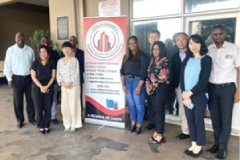The Relationship Dynamics Between China and Smaller States: A Field Study Conducted in Zambia
2023.04.07
JICA Ogata Sadako Research Institute for Peace and Development (JICA Ogata Research Institute) Executive Director Takahara Akio, Visiting Fellow Kitano Naohiro (professor at Waseda University), Research Fellow Asada Ray, and Research Officer Imai Natsuko traveled to Zambia and South Africa from Feb. 20 to 27, 2023, as part of the research project "The New Dynamics of Peace and Development in the Indo-Pacific: How Countries in the Region Proactively Interact with China."

JICA Ogata Research Institute researchers visited Zambia and South Africa as part of their research project
This study attends to the relational dynamics between China and smaller states in the Indo-Pacific region, which are becoming increasingly geopolitically important in the context of China’s ascendance as a world power. It aims to identify the domestic and international factors influencing bilateral relations, focusing on the agency of the smaller states. The seven countries selected for case studies are the Philippines, Laos, Sri Lanka, Bangladesh, Uzbekistan, Serbia, and Zambia.
Zambia has evolved as a peaceful nation since its independence in 1964, not experiencing civil war, or conflict with its neighboring countries. However, the international community imposed an economic blockade in 1965 against the racist policies of its neighbor, the Republic of Rhodesia. Thus, copper ore exports became impossible across the region and Zambia plunged into an economic crisis. Subsequently, the country surmounted the difficult circumstances after the TAZARA Railway was inaugurated in 1976, connecting Zambia to Tanzania. China supported the construction of this railway, laying the foundations of the prevailing bilateral relationship between Zambia and China. The two countries strengthened collaborations, and China became Zambia’s largest creditor. However, Zambia defaulted on its debt in November 2020. Debt restructuring negotiations began in August 2022 with China's participation after the presidential election in August 2021, when the government of Zambia changed hands. However, the current administration is also attempting to build good relations with the United States and co-hosted the Summit for Democracy in March 2023.
In this context, the JICA Ogata Research Institute research team exchanged views with the Zambian Ministry of Finance, the Ministry of Mines and Mineral Development, the Ministry of Housing and Infrastructure Development, the Chamber of Commerce, the Japanese Embassies in Zambia and South Africa, the USAID (U.S. Agency for International Development) office in Zambia, as well as the JETRO office and Standard Bank research department based in South Africa to holistically encompass the region.
The team observed a close combination of domestic politics and economic development factors in Zambia and the U.S.-China relationship. The former president of Zambia actively accepted infrastructure assistance from China but the debt ballooned and the general population became increasingly dissatisfied because it was forced to survive amidst considerable difficulties. This discontent resulted in a government change in the 2021 presidential election. Considering the fact that the current president, the leader of the opposition party for many years, was democratically elected, and Zambia voted for the UN resolution against Ukraine invasion in March 2022, the U.S. is now willing to strengthen cooperation with the current administration. However, the current president's approach of prioritizing negotiations for the resolution of the debt problem with the so-called Western camp including the UN, the IMF, the World Bank, and the U.S. has evoked concerns in opposition parties about deteriorating bilateral relations with China. It is crucial to maintain scrutiny of Zambia’s foreign policies toward major powers. The results of the study will be compiled into a paper to be published in Japanese Fiscal Year 2023.

事業事前評価表(地球規模課題対応国際科学技術協力(SATREPS)).国際協力機構 地球環境部 . 防災第一チーム. 1.案件名.国 名: フィリピン共和国.

事業事前評価表(地球規模課題対応国際科学技術協力(SATREPS)).国際協力機構 地球環境部 . 防災第一チーム. 1.案件名.国 名: フィリピン共和国.

事業事前評価表(地球規模課題対応国際科学技術協力(SATREPS)).国際協力機構 地球環境部 . 防災第一チーム. 1.案件名.国 名: フィリピン共和国.

事業事前評価表(地球規模課題対応国際科学技術協力(SATREPS)).国際協力機構 地球環境部 . 防災第一チーム. 1.案件名.国 名: フィリピン共和国.

事業事前評価表(地球規模課題対応国際科学技術協力(SATREPS)).国際協力機構 地球環境部 . 防災第一チーム. 1.案件名.国 名: フィリピン共和国.
scroll